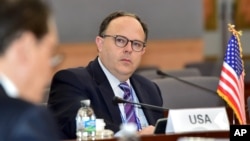The U.S. envoy to the moribund six-party talks on North Korea’s nuclear program said progress in negotiations with Iran clearly demonstrates a U.S. willingness to negotiate a resolution of the nuclear standoff with Pyongyang (DPRK).
Speaking Tuesday at the Washington D.C.-based Center for Strategic and International Studies (CSIS), U.S. envoy Sydney Seiler said the North Korean leadership faces two choices: the path to denuclearization and prosperity or its current approach of ignoring its international obligations and deepening isolation.
He said Washington has left the door of negotiation open to Pyongyang six years after the North Koreans walked out of the talks with the United States, Japan, South Korea, Russia and China in 2009.
"Progress in our nuclear talks with Iran clearly demonstrates our willingness to engages countries with whom the United States has had longstanding differences," he said. "And there should be no doubt we remain committed to negotiations and a negotiated resolution of the DPRK nuclear issue on the basis of the 2005 Joint Statement of the six-party talks the fundamental roadmap for achieving the complete, verifiable and irreversible denuclearization of the Korean peninsula."
Pursuit of nuclear weapons
In that 2005 statement, Pyongyang agreed to abandon its pursuit of nuclear weapons but has since violated it with three nuclear detonations and engaged in missile launches prompting U.N. Security Council sanctions.
Seiler said North Korea’s obfuscation and recalcitrance has not deterred U.S. efforts to pursue denuclearization. He said, aside from keeping the diplomatic door open to the North, U.S. policy seeks close cooperation with allies South Korea and Japan, as well as engaging China, with which Washington has shared goals.
"China seeks peace and stability in Northeast Asia. So do we. China seeks denuclearization of the Korean peninsula as a foundation upon which lasting peace and stability is truly obtainable. So do we," he said.
"China understands the economic benefits of a peaceful and stable Korean peninsula. So do we. And, as a path to these broader goals, China seeks a return of North Korea to authentic and credible denuclearization negotiations. So do we," Seiler added.
He said he remains optimistic about the long-term prospect of a denuclearized Korean peninsula because of improving South Korean/China relations.
The U.S. envoy also said the cases of Cuba, Myanmar, also known as Burma, and Iran underscore the willingness, flexibility and creativity the United States can show when it has a credible dialogue partner.
"Skeptics could argue that the jury’s out, but, in any case, we had three instances where a country responded to our offer to reach out a hand to those who would unclench their fist," Seiler said.
He said the international community is looking for this type of policy shift in Pyongyang and it would be positively responded to. But, Seiler said it appears the North has not learned anything from the Iran negotiations.
Nuclear arsenal
Korean scholar Sung-Yoon Lee of Tufts University said North Korea is unwilling to give up its nuclear arsenal.
"Very few, if any, nuclear weapons-possessing states have such intentions and, in history, only four nations with a nuclear arsenal have given them up and, in all those cases, there was a change in the leadership," Lee said.
"North Korea is a family dynasty that has been in place for the past six decades, and I would go out on a limb and say Iran has learned the lessons observing North Korea over the past 20 years. You sign on to an agreement, you pledge denuclearization and, in return, get concessions, lifting of sanctions or more aid, or what have you, and then you stall and see the agreement break down and then you demand new concessions, more concessions and, usually, the bigger powers follow suit," he added.
Lee said, even if six-party talks were revived, North Korea’s leadership has a compelling interest to maintain its nuclear arsenal. Otherwise, it risks, over time, being absorbed into unification with South Korea.




